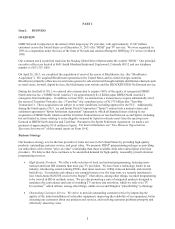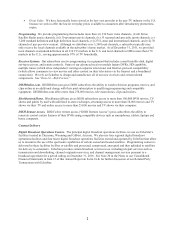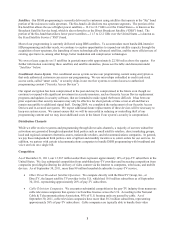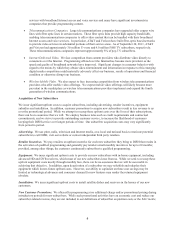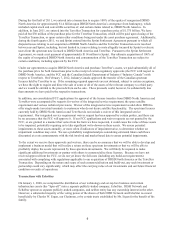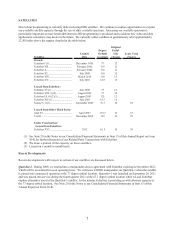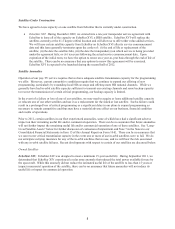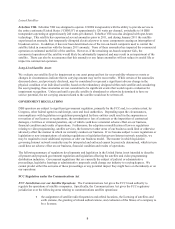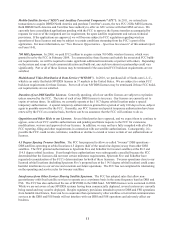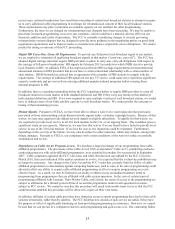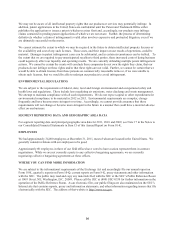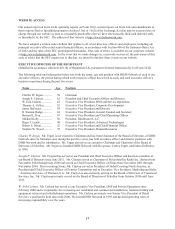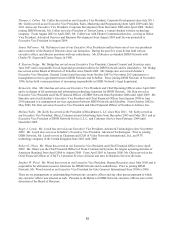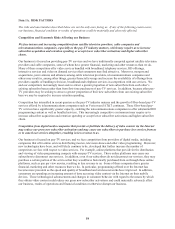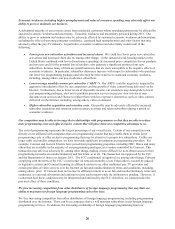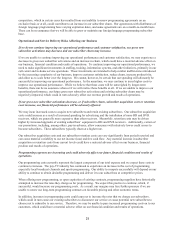Dish Network 2011 Annual Report Download - page 21
Download and view the complete annual report
Please find page 21 of the 2011 Dish Network annual report below. You can navigate through the pages in the report by either clicking on the pages listed below, or by using the keyword search tool below to find specific information within the annual report.11
11
Mobile-Satellite Service (“MSS”) and Ancillary Terrestrial Component (“ATC”). In 2011, we entered into
transactions to acquire DBSD North America and purchase TerreStar’s assets, the two FCC 2GHz MSS licensees.
Both DBSD North America and TerreStar have authority to offer an ATC service with their MSS services. We
currently have consolidated applications pending with the FCC to approve the license transfers accompanied by
requests for waiver of the integrated service requirement, the spare satellite requirement and various technical
provisions. If the applications are approved, we will become subject to FCC regulation regarding wireless
operations of these licenses and may be subject to certain conditions stemming from the FCC’s grant of the
application. For more information, see “New Business Opportunities – Spectrum Investments” of this annual report
on Form 10-K.
700 MHz Spectrum. In 2008, we paid $712 million to acquire certain 700 MHz wireless licenses, which were
granted to us by the FCC in February 2009. To commercialize these licenses and satisfy the associated FCC build-
out requirements, we will be required to make significant additional investments or partner with others. Depending
on the nature and scope of such commercialization and build-out, any such investment or partnership could vary
significantly. Part or all of these licenses may be terminated if the associated FCC build-out requirements are not
satisfied.
Multichannel Video Distribution & Data Service (“MVDDS”). In 2010, we purchased all of South.com L.L.C.,
which is an entity that holds MVDDS licenses in 37 markets in the United States. We are subject to certain FCC
build-out requirements for these licenses. Part or all of our MVDDS licenses may be terminated if those FCC build-
out requirements are not satisfied.
Duration of our DBS Satellite Licenses. Generally speaking, all of our satellite licenses are subject to expiration
unless renewed by the FCC. The term of each of our DBS licenses is ten years. Our licenses are currently set to
expire at various times. In addition, we currently operate at the 118.7 degree orbital location under a special
temporary authorization. A special temporary authorization is granted for a period of only 180 days or less, subject
again to possible renewal by the FCC. Generally, our FCC licenses and special temporary authorization have been
renewed by the FCC on a routine basis, but there can be no assurance that the FCC will continue to do so.
Opposition and Other Risks to our Licenses. Several third parties have opposed, and we expect them to continue to
oppose, some of our FCC satellite authorizations and pending and future requests to the FCC for extensions,
modifications, waivers and approvals of our licenses. In addition, we may not have fully complied with all of the
FCC reporting, filing and other requirements in connection with our satellite authorizations. Consequently, it is
possible the FCC could revoke, terminate, condition or decline to extend or renew certain of our authorizations or
licenses.
4.5 Degree Spacing Tweener Satellites. The FCC has proposed to allow so-called “tweener” DBS operations –
DBS satellites operating at orbital locations 4.5 degrees (half of the usual nine degrees) away from other DBS
satellites. The FCC granted authorizations to Spectrum Five and EchoStar for tweener satellites at the 86.5 and
114.5 degree orbital locations. Even though these authorizations were subsequently cancelled because the FCC
determined that the licensees did not meet certain milestone requirements, Spectrum Five and EchoStar have
requested reconsideration of the FCC’s determinations for both of these licensees. Tweener operations close to our
licensed orbital locations (including Spectrum Five’s proposed use at the 114.5 degree orbital location) could cause
harmful interference to our service and constrain our future operations. The FCC has not completed its rulemaking
on the operating and service rules for tweener satellites.
Interference from Other Services Sharing Satellite Spectrum. The FCC has adopted rules that allow non-
geostationary orbit fixed satellite services to operate on a co-primary basis in the same frequency band as DBS and
FSS. The FCC has also authorized the use of MVDDS in the DBS band. MVDDS licenses were auctioned in 2004.
While we are not aware of any MVDDS systems having been commercially deployed, several systems are currently
being tested and may soon be deployed. Despite regulatory provisions intended to protect DBS and FSS operations
from harmful interference, there can be no assurance that operations by other satellites or terrestrial communication
services in the DBS and FSS bands will not interfere with our DBS and FSS operations and adversely affect our
business.


